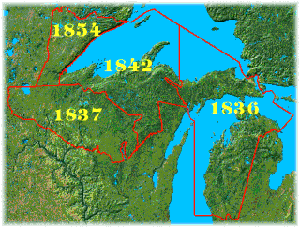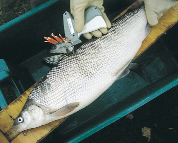Wild & Sustainable
 In more
recent years, tribes have gone to court to re-affirm tribal rights to fish in
Lake Superior. These rights were retained in the Treaties of 1836, 1842 and
1854 when tribes ceded lands to the United States government. The Jondreau
and Fox decisions in Michigan and the Gurnoe decision in Wisconsin upheld the
reserved right of the tribes to harvest both for commercial and subsistence
purposes.
In more
recent years, tribes have gone to court to re-affirm tribal rights to fish in
Lake Superior. These rights were retained in the Treaties of 1836, 1842 and
1854 when tribes ceded lands to the United States government. The Jondreau
and Fox decisions in Michigan and the Gurnoe decision in Wisconsin upheld the
reserved right of the tribes to harvest both for commercial and subsistence
purposes.
Treaty harvest in Lake Superior is regulated by the tribes, and tribal fishermen adhere to restricted quotas in order to provide opportunity for non-Indian fishing as well. The Great Lakes Indian Fish and Wildlife Commission (GLIFWC), an inter-tribal natural resource management organization representing eleven Ojibwe bands, assists its members in the regulation of the treaty commercial fishery in Lake Superior.
 GLIFWC member bands who fish commercially in
Lake Superior include the Red Cliff Band of Lake Superior Chippewa and the
Bad River Band of the Lake Superior Tribe of Chippewa Indians in Wisconsin
and the Keweenaw Bay Indian Community and the Bay Mills Indian Community in
Michigan. Large and small boats which operate during the open water season
are licensed through the respective tribes and must adhere to tribally
adopted codes regulating the fishery.
GLIFWC member bands who fish commercially in
Lake Superior include the Red Cliff Band of Lake Superior Chippewa and the
Bad River Band of the Lake Superior Tribe of Chippewa Indians in Wisconsin
and the Keweenaw Bay Indian Community and the Bay Mills Indian Community in
Michigan. Large and small boats which operate during the open water season
are licensed through the respective tribes and must adhere to tribally
adopted codes regulating the fishery.
During winter months, when sheltered bays turn solid with ice, snowmobiles instead of boats transport fishermen out to the stakes which mark their nets, and the catch is pulled through holes chopped in the ice.
Fishing is conducted primarily with gill nets
from both the large tugs and small boats. Some fishermen also harvest fish
with trap nets. While the majority of the fishery is comprised of small
boats, the majority of the harvest is taken by large boats. Whitefish, lake
trout, siscowet(or fat trout), herring, and salmon make up over 95% of the
tribal commercial harvest. Whitefish is the predominant species sought by
tribal fishermen.
The life of the commercial fisherman remains rugged and challenging. For many it is a life passed down from generation to generation. It is a way of life, lived close to nature and requiring intimate knowledge of the big water, Gitchi Gummi, and its fishery.